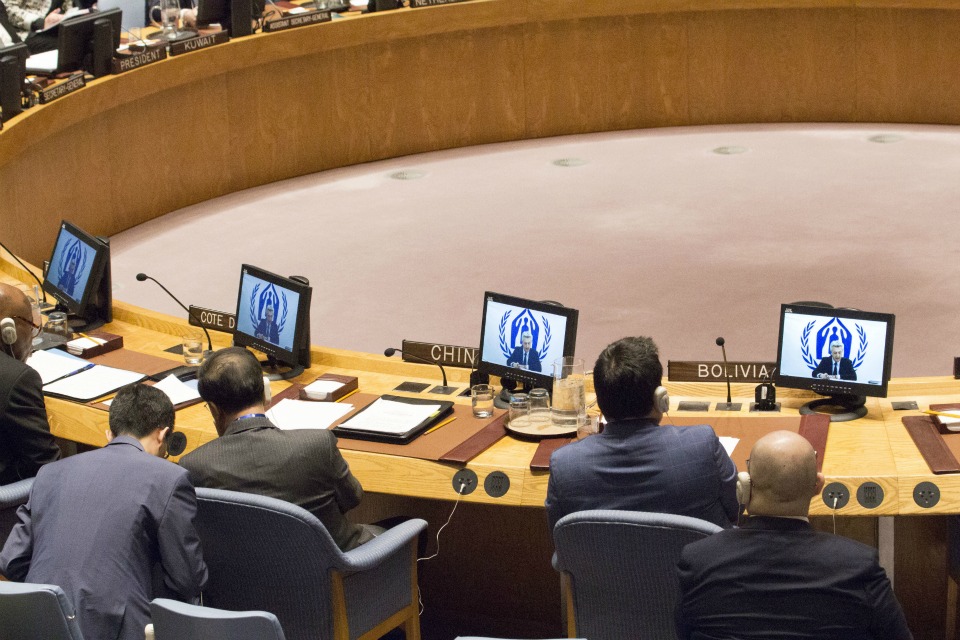Call for Safe, Voluntary, and Dignified Return of Rohingya Refugees
Statement by Ambassador Jonathan Allen, Chargé d’Affaires, at the Security Council Briefing on Burma.

Thank you Mr President,
And thank you to Assistant Secretary-General Jenca and High Commissioner Grandi for your briefings.
This weekend, UK Foreign Secretary Boris Johnson visited Cox’s Bazar, where he met some of the almost one million Rohingya refugees enduring the difficult living conditions, that you’ve heard about today. Visiting northern Rakhine, he saw with his own eyes the horror of what has happened.
When he met Daw Aung San Suu Kyi on Sunday, the Foreign Secretary said that there needed to be the right conditions created in Rakhine that make it safe for Rohingya refugees to return to their homes, free from fear, and in the knowledge that basic rights will be protected and upheld.
This Council stated last November that the Rohingya refugees must be allowed to return to their homes – safely, voluntarily, and in conditions of human dignity.
Mr President,
The UK believes that his Council has a duty to ensure those words are matched by action.
We should be clear on three things:
· We should be clear on why refugees fled Rakhine in the first place, indeed why they continue to do so; · We should be clear that the conditions in Rakhine today are not yet suitable for informed, safe, voluntary, and dignified returns; · And we should be clear what needs to be done now.
The Rohingya refugees fleeing Rakhine have suffered the most appalling violence: rape, murder, the burning of their villages.
In December, Special Representative Pramila Patten briefed us on the horrific sexual atrocities allegedly committed by the Burmese security forces.
More details emerged last week of specific atrocities committed by Burmese security forces at Gu Dar Pyin and Inn Din villages.
Even now, Rohingya still flee forced starvation and continued human rights violations.
As many of us have said, this is ethnic cleansing.
Mr President,
We welcome the Burmese government’s dialogue with Bangladesh and the initial preparations it has made for returns. Much of this is in response to this Council’s focus on the crisis.
But the UK believes the conditions in Rakhine do not yet allow for the safe, voluntary, and dignified return of refugees.
Now, Mr President, we must be clear on the way forward.
Last November’s Presidential Statement remains the guiding frame set by the United Nations Security Council for the actions which need to be taken.
I want to highlight four in particular.
First, both Myanmar and Bangladesh must cooperate fully with the United Nations. We welcome Bangladesh’s initial engagement with the UNHCR, which now needs to fully involve them in the returns process, ideally through a Tripartite Agreement. Only the UNHCR has the expertise to handle returns on this scale and give confidence to refugees. It is also essential that Myanmar allows all United Nations agencies to provide humanitarian support for all their peoples.
Second, the parties should take concrete steps to ensure that refugees will be able to return home on a voluntary basis and with access to accurate information.
Refugees should not be sent to internment camps, and Myanmar must set out how restitution of property and livelihoods will occur.
Women and girls have suffered specific sexual and gender-based violence and face specific risks. They must be represented in any decision-making process and their views given special consideration.
Dismantling the IDP camps which have existed in central Rakhine since 2012 and supporting their inhabitants in returning home would be a positive confidence-building measure.
Again we believe that the UNHCR is the only agency with the necessary expertise.
Third, Burma must ensure the safety for all communities in Rakhine. This means an immediate halt to violence and human rights violations and steps to reduce intercommunal tensions.
It also means giving refugees confidence that those who have committed crimes will be brought to justice through an open and transparent accountability process.
Instead, we have seen the arrest of two Reuters journalists who reported on those killings and the denial of access to UN-mandated human rights bodies.
The UK calls for the release of the Reuters journalists, and calls for the Burmese government’s full cooperation with the UN Fact-Finding Mission, the Special Rapporteur, and OHCHR.
Fourth, Myanmar must demonstrate progress implementing the Rakhine Advisory Commission recommendations. These recommendations continue to provide a blueprint for a more peaceful and prosperous future for all communities in Rakhine. Crucially, they address civil and political rights, including pathways for the Rohingya to receive full Burmese citizenship, as well as addressing socio-economic development. Genuine progress on implementation would demonstrate that the Burmese government is sincere about offering Rohingya refugees a viable future to return to.
Mr President,
Before I conclude, I want to once more pay tribute to Bangladesh for hosting the Rohingya community while they fled in panic for their lives.
But while they remain, Bangladesh – supported by all of us and the international community – must protect refugees and provide for their needs. This includes getting children into schools, helping men and women earn livelihoods, providing support to victims of sexual violence. Humanitarian agencies need to deliver services and prepare camps for the monsoon season.
The UK stands with Bangladesh. We have contributed £59 million in assistance. We urge the international community to do more to support Bangladesh as they help these refugees and the communities that host them.
Mr President,
The world watched in horror as the violence in Rakhine forced the Rohingya to flee. This Council has played a vital role in shining a spotlight on the situation and in encouraging action by the authorities on the ground. We must not turn away or become distracted. We should stand ready to visit ourselves, and we must be ready to take further action.
Thank you.